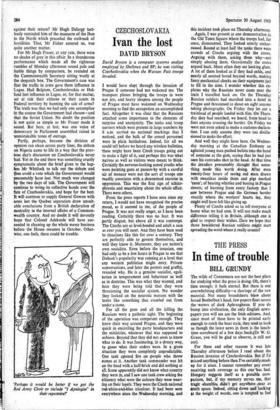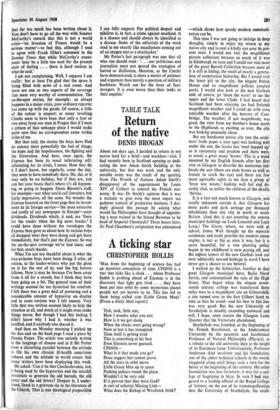In time of trouble
THE PRESS BILL GRUNDY
The wilds of Connemara are not the-best place for studying what the press is doing. Oh, there's time enough; it feels eternal. But there is one overwhelming difficulty—a shortage of the raw material. Not many broadsheets blow about broad Benbulben's head, few papers float across the 'waters of dark Aphreaghaun. If you do bump into civilisation, the only English news- papers you will see are the Irish editions. And, since most of these have to be printed early enough to catch the boat train, they .tend to look as though the latest news in them is the lunch- time scoreboard of a few days back (Dr W. G. Grace, you will be glad to observe, is still not out).
For these and other reasons it was late Thursday afternoon before I read about the Russian invasion of Czechoslovakia. But if I'd missed anything before then I've certahily,made up for it since. I cannot remember any event receiving such coverage as this one'has had. Hungary suggests itself as a possible com- parison, but, if my memory serves- me, that tragic shambles didn't get anywhere ,near as inich space. Indeed, sitting down and -looking St the weight of words, one is tempted to feel
that far too much has been written about it. You don't have to go all the way with Senator McCarthy's remark that this is not a world crisis—`an invasion of France would be a serious matter'—to feel this, although I tend to agree with Frank Giles's comment in the Sunday Times that while McCarthy's assess- ment 'may be a little too cool for the present state of feeling . . . there is hard realism in what he said.'
I am not complaining. Well, I suppose I am really: but at least I'm glad that the space is being filled with news of a real event. And there are one or two aspects of the coverage that seem very worthy of commendation. The on-the-spot stories, for example: as always happens in a major crisis, your ordinary reporter has come up with the goods. Of course, a little of the colour is suspect; so many revolting Czechs seem to have been shot only a foot or two away from our man in Prague that if I were a citizen of that unhappy place I would make quite sure that no correspondent came within miles of me.
But that said, the stories the boys have filed do convey most powerfully the feel of things, the hope and the hopelessness, the fighting and the frustration. And here, once again, the Express has been its usual infuriating self; infuriating for its rivals, I mean. How they do it I don't know, but regularly, come the day, they seem to have somebody there. He, she, or it may only be on holiday, but if they are, you can bet your boots that's where it's all happen- ing, or going to happen. Denis Blewett's stuff, for example—not what you'd call literature, but fairly impressive, all the same. No wonder the Express boasted on the front page that its invest- ment in its foreign service—`the most extensive and costly of any newspaper in Europe'—pays dividends. Dividends which, it said, are 'there for the reader when the big news breaks.' I could have done without the travelogue the Express then gave us about how its various boys all dropped what they were doing and got there immediately, but that's just the Express. So was the on-the-spot coverage we've had since, and for that, much thanks.
What I'm not too thankful about is what the stay-at-home boys have been doing. I refer, of course, to the leader-writers who put the gloss on it for the rest of us, and the big feature fellows. Now it may be because I've been away from it all for a month, but I think they have been going on a bit. The general tone of their writings seemed far too hysterical for comfort. I felt there was a great deal of posturing and a considerable amount of hypocrisy on display and in some curious way I felt uneasy. Very little that was written seemed likely to help the situation at all, and much of it might even make things worse. But though I had this feeling, I didn't know why I had it, whether it was justified, and if anybody else shared it.
And then on Monday morning I picked up the Sun and on the back page I read a piece by Dennis Potter. The article was entirely written in the language of disease and in it Mr Potter drew a disturbing parallel between the attitude to life his own chronic ill-health sometimes induces and the attitude to world events that many writers have been displaying this week.
He asked: 'Can it be that Czechoslovakia, too, is being used by the hypocrites and the suicidil pessimists to generate the old hatreds, the old panic and the old fevers? Despair is, I under- stand, listed as a grievous sin in the literature of the Church. That is one theological proposition I can fully support. For political despair and nihilism is, in fact, a crime against mankind. It is a disease and should always be identified as a disease. Some of the editorials of the week read to me exactly like manifestoes coming out of an oxygen tent or a straitjacket.'
Mr Potter's last paragraph was one that all who run should read : . . our politicians and journalists must not spread the contagion of hatred or disillusion. Heroism, as the Czechs have demonstrated, is more a matter of patience and argument than merely a question of military hardware. Watch out for the fever of fear- mongers. It is even worse than their tanks or their napalm.'



































 Previous page
Previous page